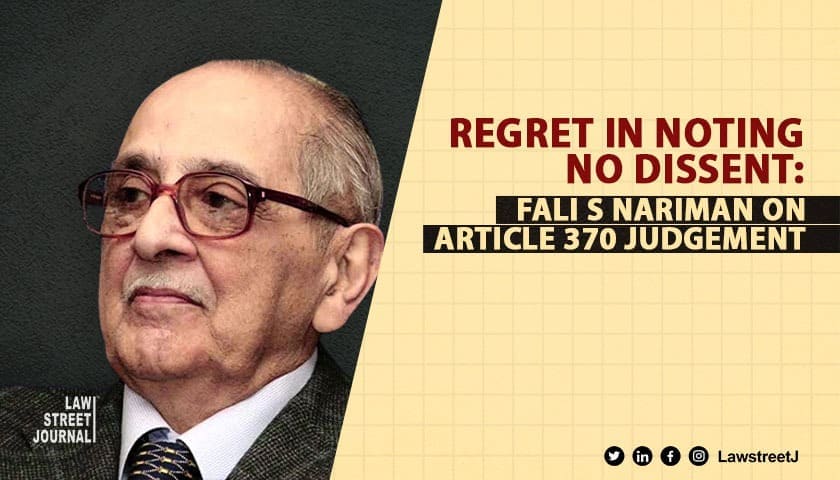NEW DELHI: Renowned Senior Advocate and jurist Fali S Nariman on Friday expressed regret noting that there was not a single dissenting judgment in the recent Supreme Court verdict on the abrogation of Article 370.
Highlighting this, he said, a dissent wouldnt have really changed the outcome of the judgement but still would have helped the general public to be better informed.
On reading on the very exhaustive and learned judgements on Kashmir recently handed down by our constitution bench of five judges, my regret has been that there was no dissent. A dissent would have made no difference to the outcome, but better still, it would have helped the not so-informed general public to better understand and appreciate the contours of this very unique, very long and somewhat complicated case about Indias northern most state. It is also necessary to recall what an American judge once wisely said - a dissent may salvage for tomorrow, a legal principle that has been omitted or forgotten today.
On December 11, a constitution bench comprising Chief Justice DY Chandrachud, and Justices Sanjay Kishan Kaul, Sanjiv Khanna, BR Gavai and Surya Kant delivered the judgment in the Article 370 case. The Bench upheld the Centres decision to revoke Jammu and Kashmir's special status under Article 370 of the Constitution in 2019. The court affirmed that the erstwhile state lacked internal sovereignty, and the state government's concurrence was unnecessary to apply the Indian Constitution.
Nariman was speaking at the 28th Justice Sunanda Bhandare Memorial Lecture on the topic titled 'Role of the Judiciary in Empowerment of Indian Women' organised by Justice Sunanda Bhandare Foundation. Justice BV Nagarathna delivered the lecture. This is what Nariman stated about the current sitting judge.
Ive witnessed her (Justice Nagarathnas) work and her demeanour on the bench. What I admire is not just her legal knowledge like that of her fathers but in important constitution cases, she has shown that she is able, ready and willing to dissent from the views expressed by other colleagues on the bench.
He also referred to Justice Rohinton Narimans book which he wrote in 2 volumes about dissenting judges around the world and their judgements. Nariman urged everyone to read the book while emphasizing on the first chapter of the book the need for dissent.
Yes, I do believe it is needed. Because often, dissent in a bench of judges, whether 3 or 5 or 7 or 9, is not just a safety valve. It also sends a message to the ever curious and ever anxious general public that the highest court is in robust health and doing its allotted tasks well.
Justice Nagarathna opined that participation of women in the judiciary is not only a constitutional imperative but also a necessary step to achieve the goal of robust, transparent, inclusive, effective and credible judicial process. According to her, having more women on the bench can contribute to a more effective space for the delivery of justice in the country.

















